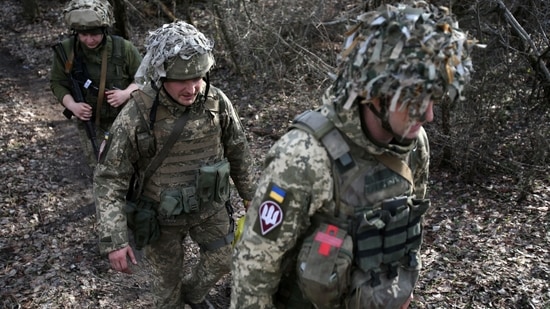Invasion/No Invasion: Russia tactics test US response
Since Moscow began massing tens of thousands of heavily armed troops on Ukraine's borders weeks ago, US President Joe Biden has repeatedly warned of sanctions with "enormous consequences" if those troops invaded.
Are they invading or not? Russian President Vladimir Putin's wily, inch-by-inch approach to Ukraine has made it hard for the United States and allies to craft their response to Europe's biggest crisis since the Cold War.

Since Moscow began massing tens of thousands of heavily armed troops on Ukraine's borders weeks ago, US President Joe Biden has repeatedly warned of sanctions with "enormous consequences" if those troops invaded.
But rather than a blitzkrieg-type offensive, Russia has edged its now 150,000-strong war force ever closer to the Ukraine frontier, announced it would recognize as independent two southeastern Ukraine regions, and deploy "peacekeepers" to the breakaway zone.
That was enough to spark the first round of punitive sanctions against Russia, and for Biden to assert that Moscow is the "aggressor" seeking to "take more territory by force."
Even on Wednesday US officials remained unwilling to categorically declare that Russian troops have actually crossed the border into Ukraine's Donbas region.
"We certainly believe that additional Russian military forces are moving into that region, not beyond that region that we have seen," Pentagon spokesman John Kirby said.
"But we can't confirm with any great specificity the numbers and what the formations are, what the capabilities are."
Instead, they zoned in on the potential for Putin launching a catastrophic conflict at a moment's notice.
"We assess today that he is near 100 percent of all the forces that we anticipated that he would move in," a defense official said on condition of anonymity.
Ambiguous messaging
Putin has done his share of obfuscation. On Monday the Russian leader recognized the rebel statelets of Lugansk and Donetsk, and authorized the deployment of so-called peacekeeping forces to the region, but he was careful not to say when Russian troops would cross into Ukraine.
"I didn't say that the troops would go there right after our meeting with you here," he said Tuesday. "It depends on the specific situation that is developing... on the ground."
It was an ambiguous message that has complicated Washington's response. The Biden administration fears that imposing maximum economic sanctions too soon would deprive Putin of a reason to stand down.
The initial US reaction Monday was therefore cautious, with sanctions targeting the two breakaway regions.
At first a White House official appeared to downplay Putin's declaration and suggest it wasn't invading, because Russian soldiers had already been operating in Donbas since 2014.
But on Tuesday Biden called Putin's order to deploy troops to the region "the beginning of a Russian invasion," unveiling a series of tougher financial sanctions in response.
'Definitely doing something'
The administration has sought to explain that its imposition of sanctions, negotiated closely with European allies anxious to preserve their economies, would be gradual.
Any further escalation by Russia will be met with "further swift and severe measures," Secretary of State Antony Blinken said.
But for some observers that is mixed messaging, especially given that multiple Western nations are observing Putin taking escalatory steps and piling troops towards the border with Ukraine.
Timothy Snyder, a professor of history at Yale University, noted that Russian military units normally stationed in Asia as a buffer against China have been redeployed to Europe.
"They're definitely doing something," Snyder, a specialist in 20th-century history of central Europe, told National Public Radio.
"And the combination of doing something and saying we're doing nothing is very confusing."



